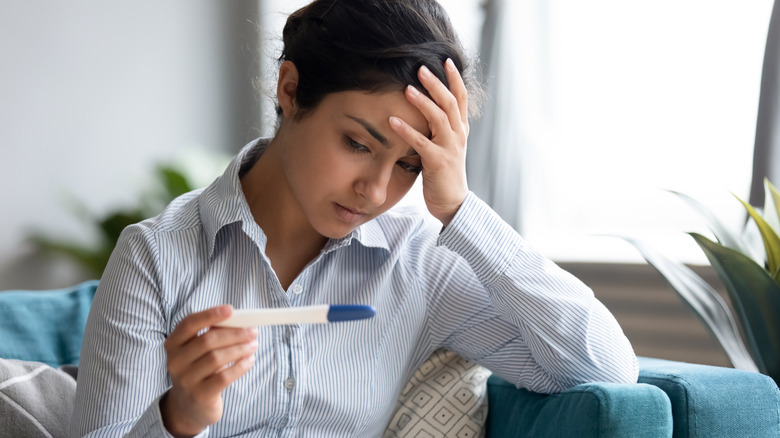Health Experts Want To Dispel The Biggest Myths About Abortions' Impact On Mental Health
A common refrain from anti-abortion activists is that abortion has negative mental health outcomes for women who choose them. The sentiments are so pervasive that some states have cited these concerns when instituting policies like pre-abortion counseling sessions, waiting periods, and two-trip requirements (via CNN). But health experts are speaking up, citing the scientific evidence that these claims are nothing more than misinformation.
A long-term study called the Turnaway Study sought to gauge the mental health of 1,000 pregnant women considering abortion across the United States (via Advancing New Standards in Reproductive Health). Between the years 2008 and 2010, researchers followed women who wanted and received an abortion and women who wanted abortions but were denied them. The women were then interviewed every six months for five years. This comprehensive study had significant results — not only did the women who had abortions experience similar or lower levels of depression and anxiety than women who carried their babies to term, but the women who had unwanted pregnancies had worse physical health outcomes since childbirth is riskier than abortion (per CNN).
The Turnaway Study found that the majority of women who received abortions felt that they made the right choice, and 99% of them maintained that feeling at the end of the five years. Social psychologist Brenda Major, who led a 2008 American Psychological Association (APA) task force on abortion and mental health, told CNN that a better indicator of not coping well after an abortion was actually their previous mental health history.
What this means in a post-Roe era
Additionally, the study found that women who had been denied an abortion were more likely to experience poverty and economic hardship, have chronic health conditions, and stay in abusive relationships (via CNN). If they had existing children younger than 5, those children were less likely to have reached developmental goals or bonded with their mother.
Prior studies have claimed that abortion causes negative mental health outcomes, but the 2008 APA task force reviewed every single one of these studies and found that many of them were poorly conducted and not scientifically sound. The task force rebuked their research quality, saying many didn't control for variations like rape, partner violence, or a prior history of mental health disorders. These flawed studies have contributed to some states' abortion policies and perpetuated misinformation.
Now that Roe v. Wade has been overturned, the adverse outcomes of unwanted pregnancy may become reality for many women across the country. According to the Guttmacher Institute, half of all abortions in the U.S. were done with a two-drug prescription medication, known as the "abortion pill." While this method has been approved by the FDA as a safe and effective option, access to this medication will now be determined by states. And to avoid the negative mental health outcomes of unwanted pregnancy, women may turn to less safe methods of obtaining an abortion.


